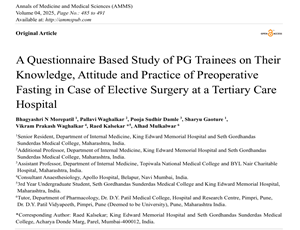A Questionnaire Based Study of Postgraduate Trainees on Their Knowledge, Attitude and Practice of Preoperative Fasting in Cases of Elective Surgery at a Tertiary Care Hospital
Authors
##plugins.themes.bootstrap3.article.main##
Abstract
Introduction: Preoperative fasting is crucial to minimize the risk of pulmonary aspiration during anaesthesia. The American Society of Anaesthesiologists (ASA) recommends specific fasting durations for solids and liquids. However, outdated practices such as “nil per oral after midnight” remain prevalent. This study assesses the knowledge, attitudes, and practices of postgraduate trainees regarding preoperative fasting guidelines. Materials and Methods: A cross-sectional observational study was conducted over six months at a tertiary care hospital in Mumbai. A structured questionnaire was administered to 150 postgraduate trainees from surgical and anaesthesiology specialties. Data were analyzed using IBM SPSS Statistics v25.0, with statistical significance set at p < 0.05. Results: While 71.33% of residents correctly identified the 6–8 hour fasting guideline for solids in adults, only 40% knew the 2-hour guideline for clear fluids. In practice, fewer trainees adhered to these guidelines. For paediatric patients, only 4% correctly identified the 4-hour fasting period for breast milk. Most trainees (50.67%) relied on seniors for guidance, and major barriers included high workload and inconsistent instructions between departments. Despite this, 70% acknowledged the benefits of shorter fasting durations. Conclusion: Although knowledge of ASA guidelines among postgraduate trainees is moderately adequate, implementation is suboptimal. Institutional efforts are needed to align practices with current evidence and enhance adherence to ERAS protocols.
##plugins.themes.bootstrap3.article.details##
Copyright (c) 2025 Bhagyashri Morepatil, Pallavi Waghalkar, Pooja Damle, Sharyu Gaoture, Vikram Waghalkar, Raed Kalsekar, Alhad Mulkalwar

This work is licensed under a Creative Commons Attribution 4.0 International License.
Creative Commons License All articles published in Annals of Medicine and Medical Sciences are licensed under a Creative Commons Attribution 4.0 International License.
[1] American Society of Anaesthesiologists Committee. Practice guidelines for preoperative fasting and the use of pharmacologic agents to reduce the risk of pulmonary aspiration: application to healthy patients undergoing elective procedures: an updated report by the American Society of Anaesthesiologists Committee on Standards and Practice Parameters. Anaesthesiology. 2011 Mar;114(3):495-511.
[2] Practice Guidelines for Preoperative Fasting and the Use of Pharmacologic Agents to Reduce the Risk of Pulmonary Aspiration: Application to Healthy Patients Undergoing Elective Procedures: An Updated Report by the American Society of Anaesthesiologists Task Force on Preoperative Fasting and the Use of Pharmacologic Agents to Reduce the Risk of Pulmonary Aspiration. Anaesthesiology. 2017 Mar;126(3):376-393.
[3] Gunawardhana A. Knowledge, attitudes and practice of preoperative fasting guidelines in the National Hospital of Sri Lanka. Sri Lankan J Anaesthesiol. 2012;20(2).
[4] Gupta N, Patnaik S, Lakkegowda LB, et al. Preoperative fasting: knowledge, attitude, and practice of postgraduate trainees at a tertiary care hospital – an observational study. Ain-Shams J Anaesthesiol. 2022;14:23.
[5] Rai V, Islam MU. Assessment of knowledge, attitude and practices of preoperative fasting among anaesthesiologists of hospitals in Ghaziabad: a cross-sectional study. Int J Sci Res. 2020;9(2):1–3
[6] Panjiar P, Kochhar A, Vajifdar H, Bhat K. A prospective survey on knowledge, attitude and current practices of pre-operative fasting amongst anaesthesiologists: A nationwide survey. Indian J Anaesth. 2019 May;63(5):350-355.
[7] Arun BG, Korula G. Preoperative fasting in children: An audit and its implications in a tertiary care hospital. J Anaesthesiol Clin Pharmacol. 2013 Jan;29(1):88-91.
[8] Dagher C, Tohme J, Bou Chebl R, Chalhoub V, Richa F, Abou Zeid H, Madi-Jebara S. Preoperative fasting: Assessment of the practices of Lebanese Anaesthesiologists. Saudi J Anaesth. 2019 Jul-Sep;13(3):184-190.

